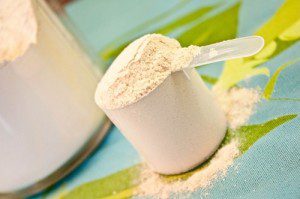Contributing Writer for Wake Up World
Commercial protein powders and shakes are a popular choice among fitness crowds as well as busy professionals, moms and pregnant women. On the surface, these expedient snacks and meals appear innocent, but upon closer examination, are fraught with health harming toxins. Whether contaminated with heavy metals, MSG or allergy triggers, taking a second look at this fashionable convenience food is worthwhile.
A tasty poison
When we drink down our protein shake each morning before bolting out the door, the last thing we would suspect is that it’s loaded with heavy metals. Unfortunately, this is the case for a majority of commercial powders. In 2010, Consumer Reports tested samples of 15 protein powders and shakes for arsenic, cadmium, lead and mercury. As reported in “Is Your Protein Powder Toxic?”….
“They found that at least one item from each product line contained detectable levels of cadmium, arsenic, lead or mercury. The three most toxic brands contained levels of heavy metal toxicity above the safe allowable limits proposed by U.S. Pharmacopeia. Many others contained levels in the low to moderate range.”
For those who would like to preserve health, any amount is too high – especially for pregnant mothers.
Take for example cadmium. It accumulates in the kidneys and causes damage while taking years to be eliminated from the body. Michael Harbut, M.D., director of the Environmental Cancer Initiative in Michigan, finds cadmium particularly worrisome:
“This (cadmium) is a highly toxic metal, and while there are some cases where decisions have to be weighed against relative risks, accepting that you have to be exposed to any cadmium at all in your protein drink after your workout is definitely not one of them.”
[pro_ad_display_adzone id=”110028″]
Heavy metals are not the only impurities, monosodium glutamate (MSG) is often present too. During the processing of high protein foods like isolates, MSG is created. Since it’s not an additional ingredient, but a consequence of the manufacturing process, MSG doesn’t need to be labelled on protein powders. Low temperature drying is an attempt to minimize the creation of monosodium glutamate, yet the end result is still a denatured protein and should be regarded with a wary eye.
Allergens are also problem. Many protein powders are made with milk and its byproducts, soy or eggs which can trigger mild to severe reactions including: digestive upset, gas, skin rashes, nausea, cramping and diarrhea. For those with an allergy, consuming the troublesome food can turn life threatening.
If you would like to forgo commercial protein powders, Sarah of the Healthy Home Economist suggests a few alternatives:
“Try gelatin instead – it has 7 grams of protein per tablespoon. Gelatin is a colloidal substance which means it attracts digestive juices to itself similar to raw foods full of enzymes. Hence, gelatin is helpful to the digestion and contains a protein kick to boot.”
Low temperature dried nutritional yeast is another option at 8 grams of protein per serving. You can also toss a quarter cup of hemp seeds in with your smoothie to give it a healthy protein boost.
She adds, “Be aware that even natural gelatin contains small amounts of MSG, so if you are particularly sensitive, you may wish to choose nutritional yeast as the better alternative.”
Sources for this article include:
- http://www.consumerreports.org
- http://www.care2.com
- http://www.thehealthyhomeeconomist.com
- http://www.livescience.com
- http://www.diseaseproof.com
- http://science.naturalnews.com/heavy_metals.html
- http://science.naturalnews.com/cadmium.html
- http://science.naturalnews.com/Monosodium_Glutamate.html
Previous articles by Carolanne:
- Cultivate Exceptional Health, Clarity and Energy with This One Nutritional Healing System
- Hemp – The Ultimate Cash Crop, Health Food and Environmental Savior Rolled Into One
- Confirmed by Science: You Really Can Change Your DNA – Here’s How
-
Chemtrails: Learn How to Protect Yourself From These Treacherous Poisons
- Kick the Caffeine Habit and Feel Better Quick with these Natural Alternatives
- Top 10 Food Frauds: Formaldehyde, Plastic, Melamine & Caustic Soda Found in Common Foods
- Autistic Boy With Higher IQ Than Einstein Discovers Gift After Removal From State-Run Therapy
-
Enhance Spiritual, Mental and Physical Well-being with a Pineal Gland Detox
[pro_ad_display_adzone id=”110025″]
Please note: this article first appeared on Natural News.
[pro_ad_display_adzone id=”110027″]







